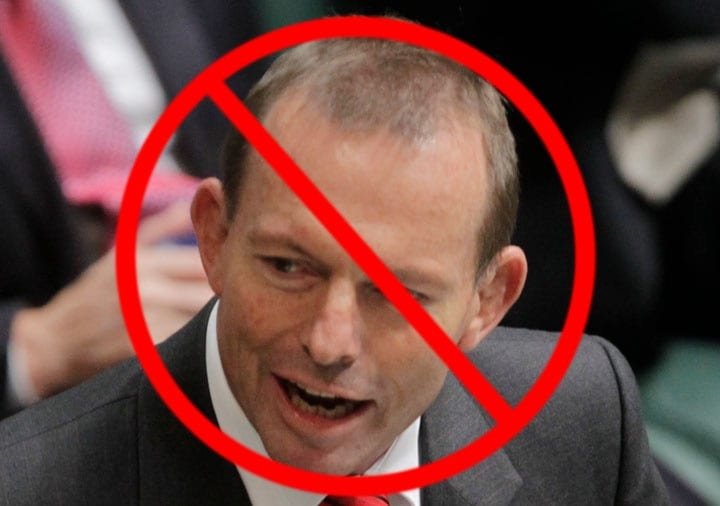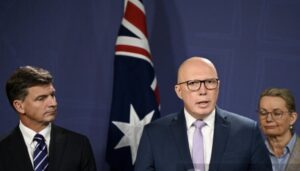France is trying to avoid a repeat of the Copenhagen disaster by keeping heads of state away from the Paris climate talks. But it has also singled out Australia and Canada as likely roadblocks.
LIMA: The French government believes it has found a way to avoid the train crash of the Copenhagen climate talks in 2009 and maximise the chance of success in Paris in 2015 – keep global leaders right away from it.
And that most certainly includes Australian Prime Minister Tony Abbott and his terrible carbon twin, Canada’s Steve Harper, whose countries were overnight named as the two worst supporting industrial countries on climate change. Only Saudi Arabia was worse. It should be remembered that Australia and the Saudis were the big hold-outs in the lead up to the Kyoto agreement in 1997 – so little has changed.
In a little-reported speech to French ambassadors in Paris in August, French foreign minister Laurent Fabius singled out Australia and Canada as two of the biggest obstacles to attaining a climate deal in December next year.
“It will be easy to convince a country already on board, but the task will be difficult for our ambassadors in Australia and Canada,” Fabius told the cream of France’s diplomatic corps.
That work will have to happen in the interim, because France – which is staking its diplomat reputation on a successful outcome – does not want to wait until the 11th hour to obtain a political solution.
Fabius said Copenhagen failed because it relied on leaders to reach agreement at the last moment. “It was thought their presence would help find a solution at the last minute. They agreed to something, but it was rejected by the plenary.”
Since that time there have been five climate summits and few political leaders, as negotiators and ministers started from scratch to put together a replacement for Kyoto that would formalise the aspirational goal agreed in Copenhagen, to try and limit average global warming to below 2°C, and to get all countries to make a contribution.
The comments by Fabius were confirmed by France’s negotiating team in Lima, who suggested that if the leaders were needed at all, it might be for a signature and a photo opportunity, not for the work itself.
“There are always some heads of state who invite themselves to the COP – conference of parties, the official name of the climate negotiations,” a spokesperson said on behalf of Laurence Tubiana, ambassador for climate change and special representative for the COP21, as the talks in Paris are officially known.
“There will be some (leaders) in Lima. No one will stop them coming. We will see for Paris. In our view, it’s foremost the responsibility of ministers to negotiate at the COPs.”
Alden Meyer, from the US-based Union of Concerned Scientists and a veteran watcher of these COPs, said the role of leaders was to give political signals, and let negotiators work out the details, and ministers to resolve the points of contention.
“In Copenhagen, we had it in the wrong order. We had the negotiators trying to work at their level, and we came up with several hundred pages of text and a lot of disagreement,” Meyer told RenewEconomy.
“Then you had the ministers coming in… but they were already looking over their shoulder knowing their leaders were going to come in the next few days, and not wanting to pre-empt them.
“And of course the leaders arrived and there was a huge textual morass. One thing that leaders can’t and shouldn’t do is negotiate text.
“Leaders need to send political signals both individually and collectively in the run-up to Paris about the need for an ambitious and comprehensive agreement, possibly on the phone before and during Paris, as they were in Kyoto in 1997, to broker any last minute challenges. “
And, Meyer noted, there will be plenty of opportunity for leaders to discuss the issue, such as at the next G20 meting in turkey, where it will be a central issue, unlike in Australia, and at the UN annual conference in September.
Australia and Canada’s conservative leaders have distinguished themselves with their opposition to climate policies, and carbon trading in particular, and their insistence on exploiting their vast fossil fuel reserves – in Australia’s case the thermal coal deposits in Queensland, and in Canada’s case the tar sands.
But Fabius wants strong ambition targets, something he may struggle to get from the likes of Australia and Canada. And he wants it to be a binding treaty, some few expect will be achieved, not least because the targets delivered by Paris will not deliver the 2°C outcome that they are supposed to.
Analysts say it will be impossible to get both, and it won’t deliver the “big bang” moment that many were expecting in Copenhagen.
“I don’t think people will be looking at Paris like they were looking at Copenhagen,” Meyer said. “It will be an important moment along the way. Important that it sends a strong signal on the long-term direction and the need to phase out fossil fuels emissions by mid century.
“It is also important that Paris sends a signal that ambition is going to be ratcheted upward fairly quickly, so you don’t lock in low ambition for decades to come.
“It would be wrong to assume that in one fell swoop Paris will close the gap between where we are and where we need to be. That will be a work of years, not months.”










